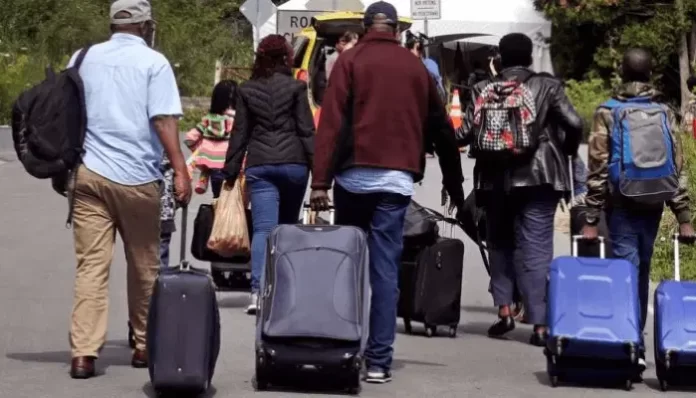A growing number of Nigerians who previously left the country in search of greener pastures abroad are now making their way back home, expressing disappointment with life overseas and struggles with mental health.
This marks a noticeable shift from the widely embraced “Japa” trend, which saw millions of Nigerians—especially youths—relocate to countries across Europe, North America, and Asia in hopes of better opportunities and living conditions.
The Japa Movement
In 2023, data from the International Organisation for Migration revealed that about 260,000 Nigerians sought migration support, with the United Kingdom being the preferred destination for 80% of them.
Similarly, statistics from the Nigeria Immigration Service (NIS) showed that more than 3.6 million Nigerians emigrated over a two-year span—over 2.1 million in 2022, and nearly 1.6 million from January to September 2023.
However, this trend is beginning to reverse, with some returnees choosing to rebuild their lives in Nigeria.
Life Abroad: A Different Reality
Judith Okoli, a 30-year-old nurse, said her two-year stay in the United States left her feeling isolated and disappointed.
Despite earning a stable income, high living costs, racism, and a lack of a sense of belonging pushed her to return to Nigeria in 2019.
“Rent alone was over $3,000 monthly,” she said. “After bills and taxes, I began to wonder what I was working for.”
Although her initial business efforts back home failed, she eventually found success in agriculture. “Farming gave me purpose. Five years later, it’s a thriving business,” she said.
She encouraged Nigerians abroad to see foreign countries as temporary platforms for acquiring resources—not permanent homes.
Mental Strain Triggers Return
A TikTok user, Kenny Igho, cited emotional distress and anxiety as the main reasons for her decision to return from the U.S. to Nigeria.
“I realised I was slipping into depression. I needed peace of mind,” she explained, urging others to overcome their fears about returning home.
‘I Left My US Job for Nigeria’
Dr. Julius Oni, a former orthopedic surgeon at Johns Hopkins University, also returned after 25 years in the U.S. to launch a healthcare center in Nigeria. He said he was driven by a desire to improve local healthcare and provide better access to orthopedic care.
Dealing with Criticism
Another returnee, Summer Aku, said she faced ridicule after moving back, with some joking that her “village people” forced her return. She now runs a short-let business and noted that many Nigerians abroad only return for funerals, often filled with regret over not being present for important family events.
Family and Career Balance
An anonymous returnee shared that juggling childcare and academic pursuits in the UK became overwhelming, leading him to move back. He now helps manage his brother’s real estate business in Nigeria and says the transition has been smooth.
Lack of Childcare and Employment Abroad
Ifeoma, another TikTok user, said she left Canada because of job insecurity and challenges finding childcare. “It was frustrating living off benefits and borrowing money from Nigeria just to survive,” she said.
Burnout Abroad, Fresh Start in Nigeria
Jenny Jones, who worked in the U.S., described feeling burnt out and unfulfilled. She has since returned to Lagos to start a fashion business. “Living in a place that drains your mental health is not worth it,” she said.
Safety and Cultural Concerns
The Idowu family, after living in the U.S. for 14 years, also returned in 2024. Despite having American citizenship, they cited rising crime, racial discrimination, and a desire for cultural connection as their reasons.
Legal Perspective
Immigration lawyer Cephas Caleb said the reasons behind the “Japada” trend include economic difficulties and emotional well-being. Another lawyer, Innocent Ekpen, added that stricter U.S. immigration policies may be playing a role.
According to Abdur-Rahman Balogun, spokesperson for the Nigerians in Diaspora Commission, many returnees are driven by emotional, financial, and security-related concerns.
Source: The PUNCH



